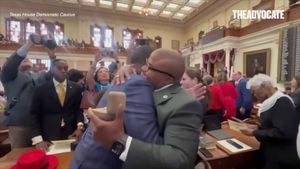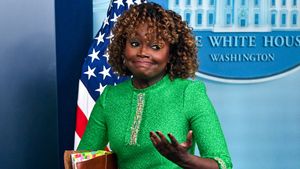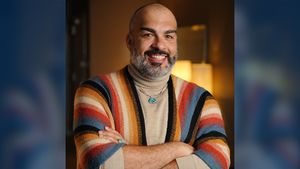A warm sense of history washes over me as I step into the lobby of the Chateau Marmont. Having witnessed everything from Led Zeppelin’s motorcycle rides in the hotel’s halls to the long list of Hollywood elite — such as Marilyn Monroe, John Wayne, and Greta Garbo — who have been among its guests, the walls of the legendary Los Angeles location could truly fill volumes if they could talk. It’s a feeling that intensifies as I sit down to speak with Annie Lennox, a woman whose career already claims several chapters in the tomes of rock and roll history, about her latest studio album, Nostalgia.
The collection represents a new musical direction for Lennox, filled with impassioned takes on songs made famous by jazz and blues greats like Louis Armstrong, Ray Charles, and Billie Holiday. Here, in an intimate corner of the building’s restaurant, the Scottish singer-songwriter beams with sweet sincerity as she explains why she felt it was time for her to put her own spin on classics from the Great American Songbook. “Because of my life experience and my musical experience through these years, there’s something in these songs I felt I could bring to them at this stage of my life that I wouldn’t be able to do as a younger person,” she explains. “And I wanted to record that, for posterity, and for anyone who has ever felt inhabited by the pain and ecstasy that is inherent in these songs.”
Lennox admits that while each song on Nostalgia has been a staple of American music for decades, she was relatively unfamiliar with most of them, and that juxtaposition made recording the album an “absolutely joyful” experience. “To be honest getting to explore these songs — just the fact that they felt so fresh to me — it was like a gift,” she says, explaining that she listened to hours of music on vinyl to find the perfect selections. “I made friends with these songs very quietly, very personally, and if I ever thought that I couldn’t cut it [recording in these genres], I would’ve just stopped. But it was such a pleasurable thing to do. I loved the process of learning the songs and creating these interpretations of them.”
Venturing into unfamiliar territory isn’t exactly a new experience for Lennox. The singer gained her substantial LGBT following thanks in part to her provocative stage presence, which mixed elements of both traditionally masculine and feminine gender expressions, during her time as one half of the ’80s synth-pop duo Eurythmics. This quickly led to Lennox being referenced as a “gender-bending” artist of the MTV generation — a label she says she found initially confusing.
“There wasn’t really a label like that before,” she says. “I remember thinking, Gender-bender? What does that mean? I haven’t got a clue, because I was simply expressing myself, and I knew very well what my gender was. However, I think the bigger question became, Was I bending my sexuality? Well, I wasn’t, because I’m not gay, but everybody sort of latched on to this notion that I would be gay and some people were disappointed that I wasn’t or thought I was in denial.”
She stops, taking a moment to smile before adding, “It’s so interesting because when you put something out that is strong and provocative in a way, people respond to it. They have their notion of what that is. But I wasn’t thinking about any of that at the time. A part of that was saying, the sum total of me — or anyone — is not only about the external, what you see. There’s another aspect that you can’t define, and in doing that I felt empowered as a performer to be able to stand shoulder-to-shoulder with a partner, who was a man, and be seen as his counterpart. That was such a feeling of strength.”
Her strength has been apparent in a number of other ways outside of her work as a trailblazing music artist. Over the years, Lennox has also proved to be a powerful agent for social chance, donating her time, money, and star power to fight for numerous causes, including LGBT rights and environmental protections as well as global HIV and AIDS awareness and education by working with a variety of organizations. Her philanthropic efforts led her to be named as a UNESCO Goodwill Ambassador for AIDS in 2010, and in 2011 she became an Officer of the Order of the British Empire in recognition of her humanitarian work.
As a person who witnessed the horrors of the AIDS crisis more than 30 years ago, Lennox admits she’s “deeply concerned” by the parallels she sees in current reactions to the Ebola virus. “It’s like déjà vu totally,” she says “It reminds me of the fear that surrounded AIDS when it first came out in the ’80s. People had all these misnomers about how the virus was transmitted and that was a disaster for a few years.”
She adds, “What needs to happen is action. Education and practical steps need to be taken, because that clearly hasn’t happened quickly enough or effectively enough. And if we’re not careful, what starts with complacency will end up with hysteria.”
Though she worries about the potential missteps that could occur in handling Ebola if lessons learned during the AIDS crisis are ignored, she says she’s happy to see the progress made in another cause she continues to champion: LGBT equality.
“We’re beginning to see a generation where some young people have never been in the closet, and that’s magnificent because more recently than people remember it was a very different time when people were extremely closeted and it was far more difficult to be gay,” she says, shaking her head. “But as wonderful as this is, labels — gay, straight, black, white, Muslim, Christian, Buddhist, pink, red, whatever — these labels are quite reductive. They’re helpful because they identify something, but they’re not the summation of all the parts and so they’re limited. There are infinite expressions of human beings on the planet, and just as each one of us has a unique fingerprint, everyone is unique and individual. Ultimately, I look for a world that doesn’t need labels, because it shouldn’t matter.”
However, until that day arrives Lennox says she plans to continue fighting for positive change both on and off the stage.
“Art is the biggest communicator, and artists have the biggest platform available to them,” she says, noting she’s excited to see how the emerging generation of artists will contribute to these causes that have been her passions. “Because art catalyzes things and brings people together in a way like nothing else can.”
Indeed, if Lennox’s past is any indication of music’s future, we’ll have reasons to feel nostalgic for years to come.
Listen to Annie Lennox’s breathtaking rendition of “Georgia on My Mind” below. Nostalgia is available now.
































































































































